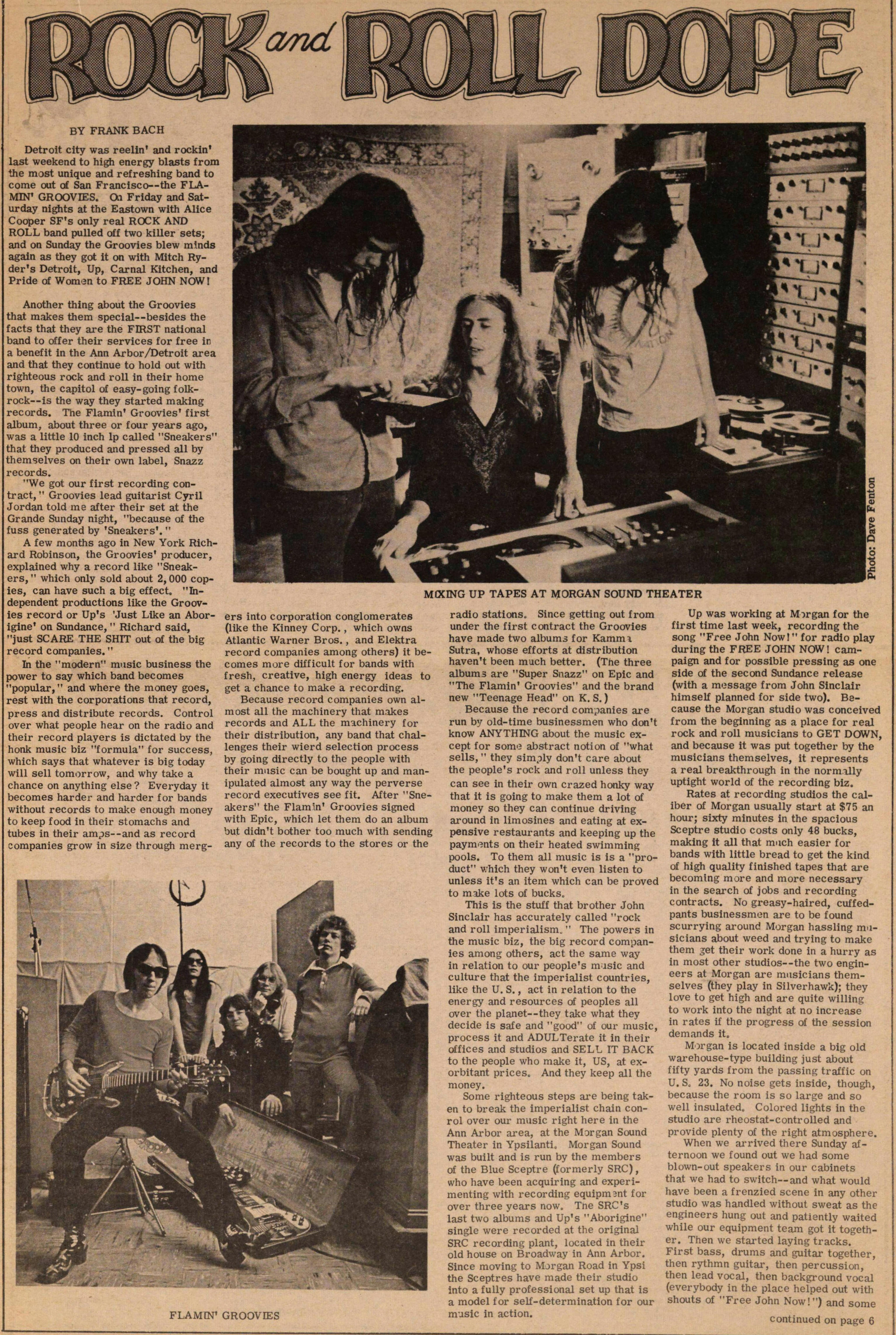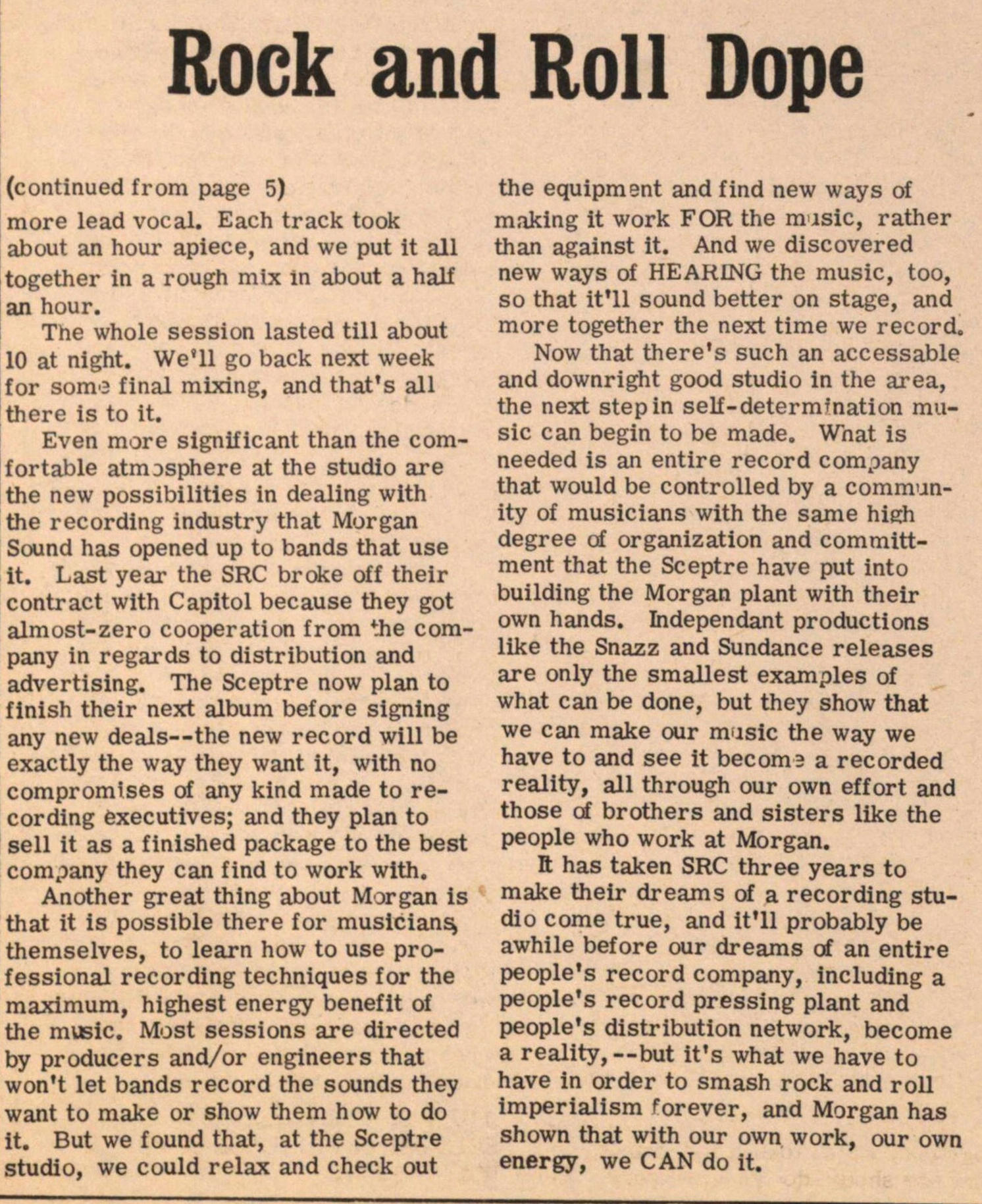Rock And Roll Dope


ROCK & ROLL DOPE
By Frank Bach
Detroit city was reelin' and rockin' last weekend to high energy blasts from the most unique and refreshing band to come out of San Francisco--the FLAMIN' GROOVIES. On Friday and Saturday nights at the Eastown with Alice Cooper SF's only real ROCK AND ROLL band pulled off two killer sets; and on Sunday the Groovies blew minds again as they got it on with Mitch Ryder's Detroit, Up, Carnal Kitchen, and Pride of Woman to FREE JOHN NOW!
Another thing about the Groovies that makes them special -- besides the facts that they are the FIRST national band to offer their services for free in a benefit in the Ann Arbor Detroit area and that they continue to hold out with righteous rock and roll in their home town, the capitol of easy-going folk-rock - is the way they started making records. The Flamin' Groovies' first album, about three or four years ago, was a little 10 inch lp called "Sneakers" that they produced and pressed all by themselves on their own label, Snazz records.
"We got our first recording contract, " Groovies lead guitarist Cyril Jordan told me after their set at the Grande Sunday night, "because of the fuss generated by 'Sneakers'. "
A few months ago in New York Richard Robinson, the Groovies' producer, explained why a record like "Sneakers, " which only sold about 2,000 copies, can have such a big effect. "Independent productions like the Groovies record or Up's 'Just Like an Aborigine' on Sundance, " Richard said, "just SCARE THE SHIT out of the big record companies."
In the "modern" music business the power to say which band becomes "popular," and where the money goes, rest with the corporations that record, press and distribute records. Control over what people hear on the radio and their record players is dictated by the honk music biz "formula" for success, which says that whatever is big today will sell tomorrow, and why take a chance on anything else ? Everyday it becomes harder and harder for bands without records to make enough money to keep food in their stomachs and tubes in their amps--and as record companies grow in size through mergers into Corporation conglomerates (like the Kinney Corp. , which owns Atlantic Warner Bros., and Elektra record companies among others) it becomes more difficult for bands with fresh, creative, high energy ideas to get a chance to make a recording.
Because record companies own almost all the machinery that makes records and ALL the machinery for their distribution, any band that challenges their wierd selection process by going directly to the people with their music can be bought up and manipulated almost any way the perverse record executives see fit. After "Sneakers" the Flamin' Groovies signed with Epic, which let them do an album but didn't bother too much with sending any of the records to the stores or the radio stations. Since getting out from under the first contract the Groovies have made two albums for Kammi Sutra, whose efforts at distribution haven't been much better. (The three albums are "Super Snazz" on Epic and "The Flamin' Groovies" and the brand new "Teenage Head" on K. S. )
Because the record companies are run by old-time businessmen who don't know ANYTHING about the music except for some abstract notion of "what sells, " they simply don't care about the people's rock and roll unless they can see in their own crazed honky way that it is going to make them a lot of money so they can continue driving around in limosines and eating at expensive restaurants and keeping up the payments on their heated swimming pools. To them all music is is a "product" which they won't even listen to unless it's an item which can be proved to make lots of bucks.
This is the stuff that brother John Sinclair has accurately called "rock and roll imperialism. " The powers in the music biz, the big record companies among others, act the same way in relation to our people's music and culture that the imperialist countries, like the U. S. , act in relation to the energy and resources of peoples all over the planet -- they take what they decide is safe and "good" of our music, process it and ADULTerate it in their offices and studios and SELL IT BACK to the people who make it, US, at exorbitant prices. And they keep all the money.
Some righteous steps are being taken to break the imperialist chain conrol over our music right her e in the Ann Arbor area, at the Morgan Sound Theater in Ypsilanti. Morgan Sound was built and is run by the members of the Blue Sceptre (formerly SRC), who have been acquiring and experimenting with recording equipment for over three years now. Tne SRC 's last two albums and Up's "Aborigine" single were recorded at the original SRC recording plant, located in their old house on Broadway in Ann Arbor. Since moving to Morgan Road in Ypsi the Sceptres have made their studio into a fully professional set up that is a model for self-determination for our music in action.
Up was working at Morgan for the first time last week, recording the song "Free John Now!" for radio play during the FREE JOHN NOW! campaign and for possible pressing as one side of the second Sundance release (with a message from John Sinclair himself planned for side two). Because the Morgan studio was conceived from the beginning as a place for real rock and roll musicians to GET DOWN, and because it was put together by the musicians themselves, it represents a real breakthrough in the normally uptight world of the recording biz.
Rates at recording studios the caliber of Morgan usually start at $75 an hour; sixty minutes in the spacious Sceptre studio costs only 48 bucks, making it all that much easier for bands with little bread to get the kind of high quality finished tapes that are becoming more and more necessary in the search of jobs and recording contracts. No greasy-haired, cuffed-pants businessmen are to be found scurrying around Morgan hassling musicians about weed and trying to make them get their work done in a hurry as in most other studios - the two engineers at Morgan are musicians themselves (they play in Silverhawk); they love to get high and are quite willing to work into the night at no increase in rates if the progress of the session demands it.
Morgan is located inside a big old warehouse-type building just about fifty yards from the passing traffic on U. S 23. No noise gets inside, though, because the room is so large and so well insulated. Colored lights in the studio are rheostat-controlled and provide plenty of the right atmosphere. When we arrived there Sunday afternoon we found out we had some blown-out speakers in our cabinets that we had to switch-- and what would have been a frenzied scene in any other studio was handled without sweat as the engineers hung out and patiently waited while our equipment team got it together. Then we started laying tracks.
First bass, drums and guitar together, then rythmn guitar, then percussion, then lead vocal, then background vocal (everybody in the place helped out with shouts of "Free John Now!") and some
continued on page 6
Rock and Roll Dope (continued from page 5)
more lead vocal. Each track took about an hour apiece, and we put it all together in a rough mix in about a half an hour.
The whole session lasted till about 10 at night. We'll go back next week for some final mixing, and that's all there is to it.
Even more significant than the comfortable atmosphere at the studio are the new possibilities in dealing with the recording industry that Morgan Sound has opened up to bands that use it. Last year the SRC broke off their contract with Capítol because they got almost-zero cooperation from the company in regards to distribution and advertising. The Sceptre now plan to finish their next album before signing any new deals -- the new record will be exactly the way they want it, with no compromises of any kind made to recording executives; and they plan to sell it as a finished package to the best company they can find to work with.
Another great thing about Morgan is that it is possible there for musicians, themselves, to learn how to use professional recording techniques for the maximum, highest energy benefit of the music. Most sessions are directed by producers and/or engineers that won't let bands record the sounds they want to make or show them how to do it. But we found that, at the Sceptre studio, we could relax and check out the equipment and find new ways of making it work FOR the music, rather than against it. And we discovered new ways of HEARING the music, too, so that it'll sound better on stage, and more together the next time we record.
Now that there's such an accessable and downright good studio in the area, the next step in self-determination music can begin to be made. What is needed is an entire record company that would be controlled by a community of musicians with the same high degree of organization and committment that the Sceptre have put into building the Morgan plant with their own hands. Independant productions like the Snazz and Sundance releases are only the smallest examples of what can be done, but they show that we can make our music the way we have to and see it become a recorded reality, all through our own effort and those of brothers and sisters like the people who work at Morgan.
It has taken SRC three years to make their dreams of a recording studio come true, and it'll probably be awhile before our dreams of an entire people's record company, including a people's record pressing plant and people's distribution network, become a reality, --but it's what we have to have in order to smash rock and roll imperialism forever, and Morgan has shown that with our own work, our own energy, we CAN do it.
Article
Subjects
Freeing John Sinclair
Old News
Ann Arbor Sun